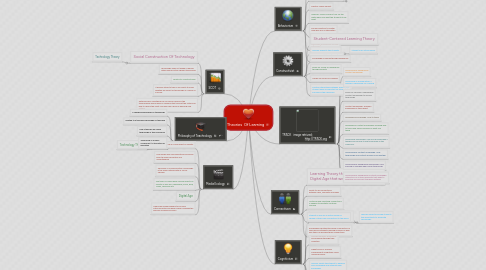Theories Of Learning
by Erika Shoemaker


1. SCOT
1.1. Social Construction Of Technology
1.1.1. Technology Theory
1.2. Technology does not shape of person rather human action shapes technology
1.3. Realtes to Constructivism
1.4. It defines steps to take if one wants to know whether an aspect of technology is a failure or success.
1.5. Determining if something is a success or failure in the technological world relies on research that looks at the criteria for how to define the "Best" and who has a hand in defining said criteria
2. Media Ecology
2.1. Technology has a HUGE effect on society
2.1.1. Technology Theory
2.2. How media and communication processes affect human perception and understanding
2.3. Advances in Communication Technology is the major determinate of Social Change
2.4. The types of Media have varying effects on society as well e.g. Newspaper, Email, Blog, Radio, Television etc
2.5. Digital Age
2.6. Media has allowed people to be more interconnected and have forever changed the way we socialize and learn
3. Philosophy of Teachnology
3.1. A Teachers philosophy on technology
3.2. Related to a teachers philosophy on teaching
3.3. How a teacher will infuse technology in their classroom
3.4. Technology is a major component to the future of education
4. Behaviorism
4.1. Learning Theory
4.1.1. Teacher Directed
4.1.2. Student is a passive learner
4.2. B.F. Skinner Operate Conditioning
4.2.1. Session Rule 1
4.2.2. Session Rule 2
4.3. Practice Makes Perfect
4.4. Shaping- Using Cues e.g. turn off the lights when you want the students to be quiet
4.5. Drill and Practice to master new skills e.g. Multiplication Tables
4.6. Rewards and Praise for good outcomes, punishment for bad outcomes
4.7. Teacher holds total control in the classroom and is seen as dominate
5. Constructivist
5.1. Student-Centered Learning Theory
5.2. Teacher supports the Students
5.2.1. Student is an active learner
5.3. Knowledge is learned through experience
5.4. Relies on Hands-on experience through projects
5.5. Hands On Minds On Thinking
5.6. Positive interactions between Teacher and Student seen as important for students to succeed in the classroom.
6. Cognitivism
6.1. Cognitive Psychology
6.1.1. Sub Idea 1
6.1.2. Sub Idea 2
6.2. the way people think impacts their behavior
6.3. humans generate knowledge and meaning through their cognition
6.4. Piaget Zone of Proximal Development &Vygotsky Social Learning Theory
6.5. Teacher assists the student to develop prior knowledge and integrate new knowledge
6.6. This Theory relies on Scaffolding, students need to slowly work on a bit harder tasks to fully develop their cognitive thinking skills
6.7. Students solve problems
7. Connectivsm
7.1. Learning Theory that relates to the Digital Age that we are currently living in.
7.2. Ability to see connections between field, concepts and ideas
7.3. Nurturing and maintaing connections is needed to facilitate continual learning
7.4. Student is seen as an active learner in charge of their own connections to the world.
7.4.1. Teacher needs to provide students the opportunity to work with Technology
